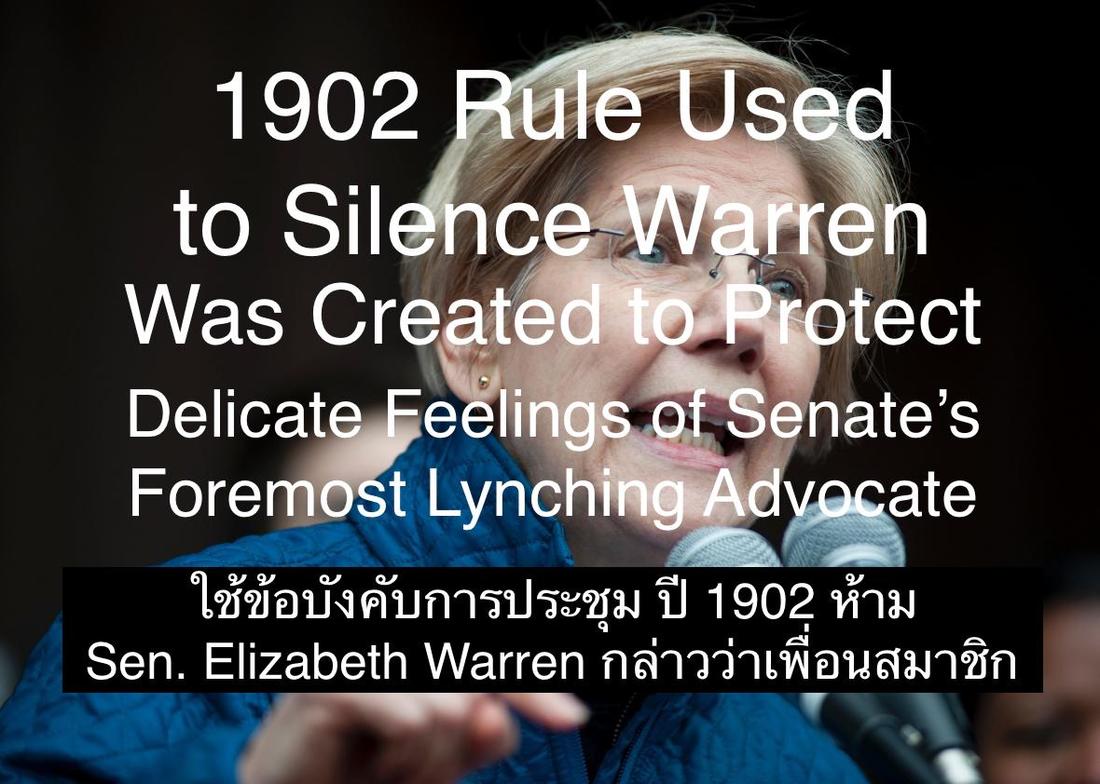
YOUR NEWS COMPANION
FEB. 8 2017 11:36 AM Rule Used to Silence Warren Was Created to Protect Delicate Feelings of Senate’s Foremost Lynching Advocate By Ben Mathis-Lilley On Tuesday night Mitch McConnell invoked part of one of the Senate's rules of debate—part of Rule 19—to stop Elizabeth Warren from speaking while she was reading a 1986 letter, written by Coretta Scott King, that criticizes attorney general nominee Jeff Sessions' record on civil rights. The Washington Post notesthat this guideline was enacted in 1902 after a fight on the Senate floor. Here, from a book called The American Senate: An Insider's History, is the context: An incident in the 1850s inspired consideration about adopting a rule to curb such excesses, but the Senate finally did so only after an ugly episode during a debate in 1902. South Carolina's "Pitchfork Ben" Tillman accused his South Carolina colleague, John McLaurin, of selling his vote for federal patronage. McLaurin called Tillman a malicious liar. Tillman lunged at him, striking him above the left eye. McLaurin hit Tillman back with an upper-cut to the nose. They were separated by other senators, and the brawl caused consternation throughout political Washington. Senator George Hoar of Massachusetts seized the occasion to propose a rule he long had had in mind: "No senator in debate shall, directly or indirectly or by any form of words impute to another senator or to other senators any conduct or motive unworthy or unbecoming a senator." Once adopted, senators had the means of instantly quieting raucous or abusive debates. The rule was created, in other words, to protect senators like Ben Tillman from hearing mean things that would make them so mad they had to punch someone. And Ben Tillman, as it happens, is perhaps the most notorious proponent of racial terrorism in the history of the United States. Here are just a few of the things Tillman said during his horrific political career:
Ben Mathis-Lilley edits the Slatest. Follow @Slatest on Twitter. |
Elizabeth Warren on the floor of the Senate on Monday.Senate TV via AP
Mitch McConnell Inadvertently Coined the Latest Feminist Catchphrase: “She Persisted”
By Christina Cauterucci Mitch McConnell and his fellow Senate Republicans voted Tuesday evening to stop Elizabeth Warren from speaking during the debate over Jeff Sessions’ nomination for attorney general. Warren was reading aloud from a scathing 1986 letter Coretta Scott King wrote opposing Sessions as a potential federal judge, when McConnell interrupted her mid-sentence to invoke a rule that prevents senators from ascribing “unbecoming” conduct to another senator. “She was warned,” McConnell said on the Senate floor after the confrontation. “She was given an explanation. Nevertheless, she persisted.” It’s hard to imagine a pithier encapsulation of nearly every struggle for justice in the history of humanity. Without even trying, McConnell wrote the future epitaph of hundreds of people who have the phrase “nasty woman” in their Twitter bios. #ShePersisted and #LetLizSpeak have emerged as the hashtags with which to commemorate this important moment. Just two weeks after Warren drew heatfor voting to advance Ben Carson’s nomination for Housing and Urban Development secretary, she’s emerged as a symbol of the type of perseverance certain Republicans hate most: women’s. The silencing of Warren is doubly insulting because it amounted to a silencing of King, the late civil rights activist and wife of Martin Luther King, Jr., whose letter spoke to Sessions’ persistent (!) harassment of black voting rights activists and intimidation of elderly black voters. McConnell’s heartfelt ode to female strength in the face of opposition was a natural candidate for Twitter tributes, because reclamations of politicians’ insults are all the rage these days. Freshman Sen. Kamala Harris has already turned it into a meme. The phrase sounds like something a grumpy old man would say of an incorrigible ward, something that might be directed at little orphan Annie or Matilda Wormwood. Almost every kids’ book or movie about a determined, big-hearted, long-suffering heroine has the villain saying something like, “She was warned. … Nevertheless, she persisted.” See: this vintage footage of Elizabeth Warren persisting against an evil archdeacon’s attempts to silence her. The GOP’s paternalistic attitude toward women in power is well captured by McConnell’s condescending tone. Recall when Donald Trump called Hillary Clinton a “nasty woman” when she questioned his tax returns, and when Republican Rep. Brian Babin of Texas defended him by saying, “sometimes a lady needs to be told when she’s being nasty.” Persistence has historically been deemed an unattractive quality for a woman to possess, as historian Mike Duncan pointed out on Twitter Wednesday morning. When Ida B. Wells sued a railroad for physically removing her from the ladies’ car because she was black in 1884, the Tennessee Supreme Court overturned her initial court victory, casting scorn on her “unladylike ‘persistence.’” But the men of the Senate are persistent, too: Democrats Tom Udall, Sherrod Brown, and Bernie Sanders all read King’s letter on the Senate floor Wednesday morning, and McConnell didn’t excrete a single peep. According to NBC, “Aides to Republican leadership say Warren was not punished for simply reading the letter, but for ignoring warnings about being silenced and delivering a disparaging speech that went beyond simply reading King’s words.” How a senator might read a letter that describes targeted abuse of black voters without disparaging the perpetrator of that abuse is one heck of a brain teaser. CHRISTINA CAUTERUCCIChristina Cauterucci is a Slatestaff writer. |
|
|




